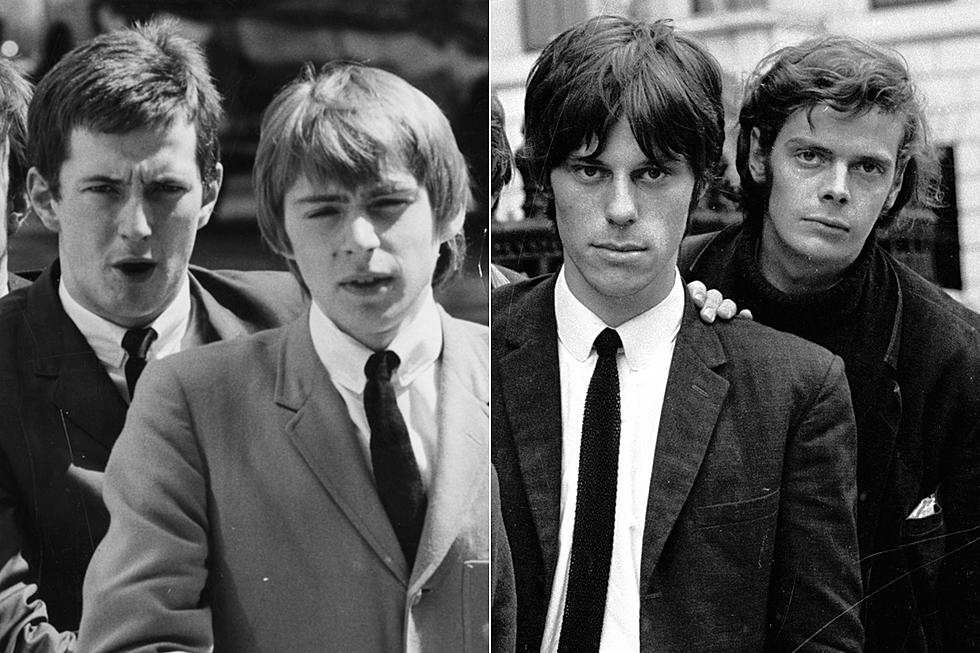
How Eric Clapton’s Split With Yardbirds Caused a Chain Reaction
Eric Clapton couldn’t have known what would happen when he quit the Yardbirds on March 13, 1965. All he knew at the time was that, after two years with the fledgling blues band, he wasn’t happy – and neither were they.
He’d already gained the nickname “Slowhand” after an unhappy audience offered a slow hand clap while he was forced to stop playing to change a string. But he’d go on to gain so much more after his decision to bow out at the age of 20, with the initial plan of giving up music altogether.
“I played with two amateur groups before [the Yardbirds] in my spare time,” Clapton told Rolling Stone in 1968. “I didn’t stay with either of those bands for more than two weeks. It was more like jamming. Then I got offered a professional job with the Yardbirds. … I was with them a year and a half. They weren’t too keen to have it known that I’d left. People leaving groups in those days was dirty.”
In his relatively short time with the band, he’d made a name for himself after the Yardbirds took over the Rolling Stones' spot at London’s iconic Crawdaddy Club. Both Clapton and the group were gaining buzz by the time their third single, “For Your Love,” was released. But that song proved to be Clapton’s tripping point. He left before its release and didn’t take any part in its promotional campaign.
“I liked it because it was very unusual,” drummer Jim McCarty told AZ Central of the pop single in 2018. “It was moody. It had the percussive things with the bongos. It had the time change in the middle. … I always knew it was gonna be a big song.”
Listen to the Yardbirds' ‘For Your Love’
McCarty admitted the track was a major contribution to Clapton’s departure. “He didn’t like the way we were going into a pop thing rather than a blues thing," he explained. "Everything revolved around hit singles in those days. You had to produce a great hit single in order to keep up. And we tried other things. We tried things from our repertoire. But they never sounded great in the English studios for some reason. They never really had the sound that we got later on when we recorded at Chess in Chicago and Sun down in Memphis.”
While his bandmates were exploring new music, Clapton was taking the opportunity to look further into the past. “I played exactly like Chuck Berry for six or seven months,” he said of an approach that can be heard on the band’s first single, “I Wish You Would.”
“You couldn’t have told the difference when I was with the Yardbirds," Clapton noted. "Then I got into older bluesmen. … I just finally got completely overwhelmed in this brand new world. I studied it and listened to it and went right down in it and came back up in it. … When I came back up in it, turned on to B. B. King and it’s been that way ever since. I still don’t think there is a better blues guitarist in the world than B. B. King.”
Looking back, McCarty described his former colleague as “a very dedicated player, always very enthusiastic about playing the blues. ... I got to like him and we had a good relationship – a jokey, fun relationship, in a way. But he’s the sort of person that would be very intense as a friend for a while and then he’d move on and you wouldn’t see him.”
He added that he thinks "the other side of Eric leaving was that he didn’t really want to be part of the team. I think he was destined to be his own guy. He didn’t really hit it off with the rest of the entourage. He was sitting on one end of the van when we were traveling, with the rest of us all together. So it was difficult for us to work anyway, with someone like that in the group. We wanted someone who was going to join in.”
Listen to the Yardbirds' ‘I Wish You Would’
In 2019, McCarty said that "aggravation" between Clapton and bassist Paul Samwell-Smith was a contributing factor in the split. "The two saw life differently," , he told Forbes. "Eric aligned himself with the lower class, the working class, at that time. Paul wanted to be much more upper-crust, even though he was from the working class as well. His parents adopted the last name Samwell-Smith – they put their two names together so his mother would not have to be Mrs. Smith. From that, Paul wanted to be upper-class. I think that was the basis of their differences."
Clapton later said he didn't plan to keep playing after his these early experiences. “I was fooled into joining the group, attracted by the pop thing, the big money and traveling around and little chicks,” he admitted. “It wasn’t until after a year and a half that I started to take music as a serious thing.
"I intended to pack up playing all together," Clapton added. "I was kind of screwed up about everything. Playing with a group like that puts you in a very strange frame of mind. You lose a lot of your original values. I laid up for a couple of weeks with a friend. Didn’t do much and then I got offered a job with John Mayall, whom I’d always admired because of his integrity. If I was going to join anyone, it might as well be him.”
Before bowing out, Clapton recommended his friend Jimmy Page as his replacement. The band extended an invitation but Page refused. Instead, they settled on Jeff Beck, who guided the Yardbirds through their most commercially successful period. Page would indeed join the group later, and for a short period they presented a twin-guitar lineup before Beck was fired.
Clapton left Mayall’s band after another 18 months, deciding that he wanted to put a new twist on blues playing, which led to the founding of Cream. But his decision to quit the Yardbirds had triggered a chain reaction that also led to the creation of Led Zeppelin, the Jeff Beck Group and an entire genre of heavy blues that would find a permanent place in the history of rock ’n’ roll – a genre Clapton himself described as “contemporary folk music” in a nod to the original blues that had inspired him.
Top 40 Blues Rock Albums
Was Jimmy Page Almost Part of a New Supergroup?
More From US 103.1 FM





![In 1963 Eric Clapton Gets A Call To Become A Yardbird [AUDIO]](http://townsquare.media/site/86/files/2017/10/eric-clapton-yardbirds.jpg?w=980&q=75)




